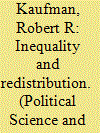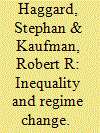| Srl | Item |
| 1 |
ID:
165861


|
|
|
|
|
| Summary/Abstract |
We explore what can be learned from authoritarian backsliding in middle income countries about the threats to American democracy posed by the election of Donald Trump. We develop some causal hunches and an empirical baseline by considering the rise of elected autocrats in Venezuela, Turkey, and Hungary. Although American political institutions may forestall a reversion to electoral autocracy, we see some striking parallels in terms of democratic dysfunction, polarization, the nature of autocratic appeals, and the processes through which autocratic incumbents sought to exploit elected office. These processes could generate a diminished democratic system in which electoral competition survives, but within a political space that is narrowed by weakened horizontal checks on executive power and rule of law.
|
|
|
|
|
|
|
|
|
|
|
|
|
|
|
|
| 2 |
ID:
098229


|
|
|
| 3 |
ID:
121127


|
|
|
|
|
| Publication |
2012.
|
| Summary/Abstract |
Recent work by Carles Boix and Daron Acemoglu and James Robinson has focused on the role of inequality and distributive conflict in transitions to and from democratic rule. We assess these claims through causal process observation, using an original qualitative dataset on democratic transitions and reversions during the "third wave" from 1980 to 2000. We show that distributive conflict, a key causal mechanism in these theories, is present in just over half of all transition cases. Against theoretical expectations, a substantial number of these transitions occur in countries with high levels of inequality. Less than a third of all reversions are driven by distributive conflicts between elites and masses. We suggest a variety of alternative causal pathways to both transitions and reversions.
|
|
|
|
|
|
|
|
|
|
|
|
|
|
|
|